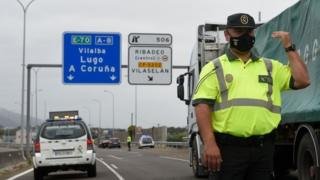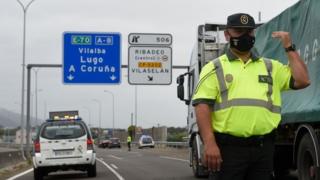
 Image copyright
Image copyright
AFP
The study estimates that around just 5% of the Spanish population has developed antibodies
A Spanish study has cast doubt on the feasibility of herd immunity as a way of tackling the coronavirus pandemic.
The study of more than 60,000 people estimates that around just 5% of the Spanish population has developed antibodies, the medical journal the Lancet reported.
Herd immunity is achieved when enough people become infected with a virus to stop its spread.
Around 70% to 90% of a population needs to be immune to protect the uninfected.
The prevalence of Covid-19 antibodies was below 3% in coastal regions, but higher in areas of Spain with widespread outbreaks, the report said.
“Despite the high impact of Covid-19 in Spain, prevalence estimates remain low and are clearly insufficient to provide herd immunity,” the study’s authors said in the report.
“This cannot be achieved without accepting the collateral damage of many deaths in the susceptible population and overburdening of health systems.
“In this situation, social distance measures and efforts to identify and isolate new cases and their contacts are imperative for future epidemic control.”
The study is thought to be the largest of its kind on the coronavirus in Europe.
There have been studies of a similar kind in China and the US and “the key finding from these representative cohorts is that most of the population appears to have remained unexposed” to the coronavirus, “even in areas with widespread virus circulation,” the Lancet article said.
What’s the latest in Spain?
The country has recorded more than a quarter of a million cases and at least 28,385 deaths. But daily fatalities have been in the single figures for most of the past three weeks.
However, officials in the north-western region of Galicia have re-imposed restrictions on an area of 70,000 people following an outbreak.
Officials linked local outbreaks to bars in the area. Capacity in bars and restaurants have been limited to 50%.
There are now 258 cases of Covid-19 in Galicia, including 117 in Lugo province, authorities say.
On Saturday the autonomous government of Catalonia re-imposed controls on an area of 210,000 residents after a sharp rise in infections there.
Catalan President Quim Torra said no-one would be allowed to enter or leave Segrià, a district west of Barcelona that includes the city of Lleida.

Media playback is unsupported on your device


